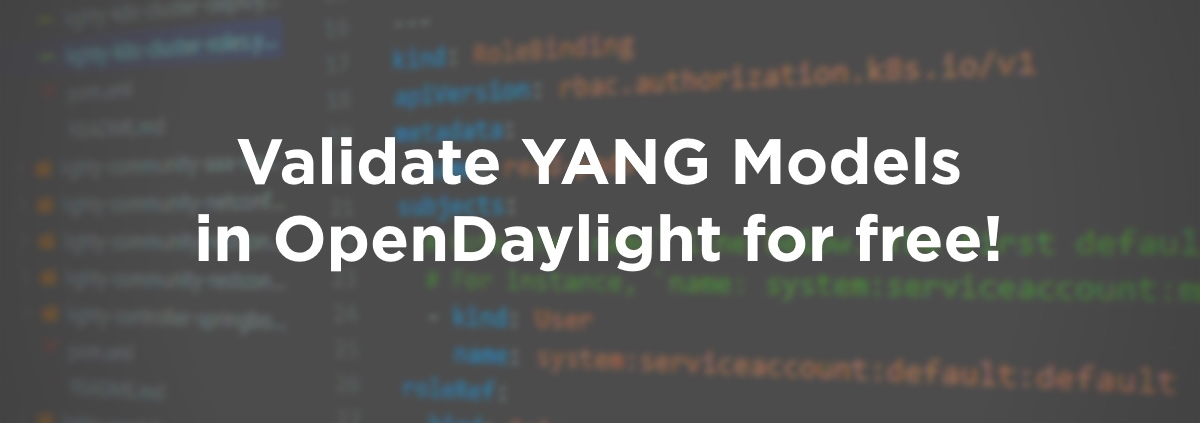Validate YANG Models in OpenDaylight for Free
lighty YANG Validator
Customers can create, validate and visualize the YANG data model of their application, without the need to call any other external tool – just by using the lighty.io framework.
YANG Tools helps to parse YANG modules, represent the YANG model in Java, and serialize/deserialize YANG model data. However, a custom YANG module can contain improper data that would result in an application failure. To avoid such annoying situations, PANTHEON.tech engineers created the lighty YANG Validator.
lighty.io YANG Validator
Send download link to:
lighty.io, a Software Development Kit powered by OpenDaylight and developed by PANTHEON.tech, is a very useful tool to accelerate the development of Software-Defined Networking (SDN) solutions in Java.
Its LightyController component utilizes OpenDaylight’s core components, including YANGtools, that provides a set of tools and libraries for YANG modeling of the network topology, configuration, and state data as defined by YANG 1.0 and YANG 1.1 models.
Prerequisites
- Download the distribution from this page.
- Make sure to run the tool in Linux and with Java installed.
- Unzip the folder and read through the README.md file
What does the lighty YANG Validator offer?
The lighty YANG Validator (lighty-yang-validator) was inspired by pyang – python YANG validation tool. It checks the YANG module using the YANG Parser module. In case of any problem during parsing, the corresponding stack trace is returned to let you know what’s wrong and where.
In addition to the pyang implementation, the lighty YANG Validator, built on top of OpenDaylight’s YANG engine, checks not only the standard YANG compatibility but it validates the given module as a module compatible with lighty.io or OpenDaylight framework.
Users can choose to validate only one module or all modules within the given directory.
It’s not necessary to have all the imported and included modules of a validating module in the same path. It is possible to use -p, –path option with a path or colon-separated paths to needed module(s). YANG Validator can search for modules recursively within the file structure.
Of course, the customer can decide to search for the file just by module name instead of specifying the whole path!
Backwards Compatibility
The lighty YANG Validator allows checking the backward compatibility of the updated YANG module via –check-update-from option. Customers can select to validate backward compatibility according to RFC6020 or RFC7950.
The lighty YANG Validator can be further used for:
- Verification of backward-compatibility for a module
- Notification of users about module status change (removal/deprecation)
Simplify the YANG file
The YANG file is possible to simplify based on the XML payload. The resulting data model can be reduced by removing all nodes that are defined with an “if-feature”. This functionality is very useful with huge YANG files, that are tested with some basic configuration and not all schema nodes are used.
Utilization of such trimmed YANG files can significantly speed uploading of customer’s application in the development phase when the application is started repetitively. Thus, it saves overall development time. A simplified YANG file is printed out to standard output unless the output directory is defined.
User can choose between the following output types:
- Tree in format \<status>–\<flags> \<name>\<opts> \<type> <if-features>
- Name-Revision in format \<module_name>@\<revision>
- List of all modules that validated module depends on
- JSON Tree with all the node information
- HTML Page with javascript for the visualization of the yang tree
- YANG File / simplified YANG file
Goal: Create a stable and reliable custom application
lighty.io was developed to provide a lightweight implementation of core OpenDaylight components so customers are able to run their applications in a plain Java SE environment. PANTHEON.tech keeps working on the improvements for that framework to make its usage as easy as possible to the customers to create stable and reliable applications.
One step forward in this journey is the lighty YANG Validator – customers can create, validate and visualize the YANG data model of their application just by using the lighty.io framework without the need to call any other external tool.



